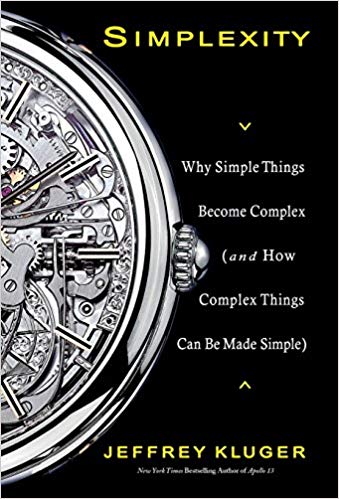 Simplexity –Why Simple Things Become Complex (and How Complex Things Can Be Made Simple) has been on my bookshelf for a few years. I have started and stopped reading this book more than a few times. So it was on the top of my stack of books to read this year. It is interesting to note that the book uses an example of truck driving as complex and not likely to be replaced by automation. Even though this book might be slightly dated, the concepts are still valid. Simplexity is not the standard technology book. It falls into the science genre. Simplexity is a book that explains in simpler than theory terms, the concepts of complexity in a real-world application.
Simplexity –Why Simple Things Become Complex (and How Complex Things Can Be Made Simple) has been on my bookshelf for a few years. I have started and stopped reading this book more than a few times. So it was on the top of my stack of books to read this year. It is interesting to note that the book uses an example of truck driving as complex and not likely to be replaced by automation. Even though this book might be slightly dated, the concepts are still valid. Simplexity is not the standard technology book. It falls into the science genre. Simplexity is a book that explains in simpler than theory terms, the concepts of complexity in a real-world application.
Simplexity attempts to explain or define what is complex and what is simple and then looks at many different real-live scenarios such as road congestion and city planning, stock markets and remote controls with any eye for why the are complex and how they could be simple. There is an interesting use of a normal distribution curve in the early chapters with “simple” represented by the tails of the curve and the center peak representing “complex”. Highway usage and complexity can be represented by the curve. A highway that is over capacity or under utilized would be considered simple and represented by the tails of the curve. As more cars enter a under utilized highway the complexity increases until it hits a max, at the top of the curve, and then things slows down until traffic stops. Stopped traffic is simple. Keeping traffic moving when it there are many vehicles using the roadway is complex.
The traffic analogy might seem to counter-intuitive. The author provides simple rational arguments to bolster his point. The author also provides examples where what we think of as a common solution to a complex problem might not be the answer. For example, simply widening a road that is congested, might lead to more congestion not less.
Like most things in life, complexity or simplexity is relative. What appears to be complex could be viewed as simple depending on the perspective of the viewer. Read this book and you might start looking at complexity in a different light. Read this book and you might simplify your complex problems in a completely different way.
Have a book that is a must read? Drop me a comment or email and give me a suggestion of books to add to the pile!


